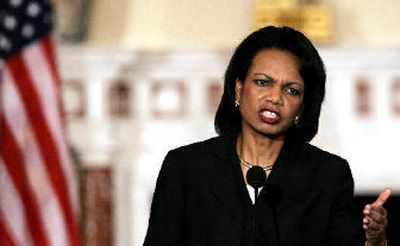U.S. offers to join talks with Iran

WASHINGTON – The Bush administration offered for the first time Wednesday to join European talks with Iran over its nuclear program but only if the Iranian government suspends efforts to enrich uranium and reprocess spent nuclear fuel, which the administration calls part of a covert attempt to make bombs.
Secretary of State Condoleezza Rice announced the U.S. policy shift at a State Department news conference, warning that if the Iranian government chooses not to negotiate and to continue pursuing its nuclear ambitions, “it will incur only great costs.”
“We urge Iran to make this choice for peace, to abandon its ambition for nuclear weapons,” Rice said. Refusing to do so, she added, “will lead to international isolation and progressively stronger political and economic sanctions.”
A senior administration official said there is substantial agreement from Russia and China – two nations that have resisted sanctions against Iran – on an escalating series of U.N. penalties that would be imposed if Iran does not comply. He said negotiators are expected to finalize a package that includes potential sanctions for noncompliance, as well as benefits if Iran accepts a deal being crafted by several nations during a meeting in Vienna today.
Rice left for the meeting shortly after her announcement.
The Bush administration previously refused to engage in direct talks with Iran on its nuclear program, preferring to let three European Union nations – Britain, France and Germany, known as the EU3 – conduct negotiations.
But Germany lately has increasingly urged Washington to deal with Tehran directly, as have a growing roster of foreign policy experts and at least two U.S. senators.
“I thought it was important for the United States to take the lead, along with our partners, and that’s what you’re seeing,” President Bush told reporters. “You’re seeing robust diplomacy. I believe this problem can be solved diplomatically, and I’m going to give it every effort to do so.”
John Bolton, U.S. ambassador to the United Nations, called Javad Zarif, Iran’s U.N. ambassador, before Rice’s announcement to inform him of the administration’s willingness to engage in direct talks.
Meanwhile, Rice’s remarks also were given to the Swiss ambassador to the United States for transmission to Iran.
Iran’s official Islamic Republic News Agency seemed to dismiss the offer, saying that the country accepts only proposals that are in its interest, the Associated Press reported. “Halting enrichment definitely doesn’t meet such interests,” IRNA said. Iranian officials have long insisted that their nuclear program is limited to peaceful purposes.
Senior Chinese and Russian officials welcomed the U.S. offer of direct talks, saying it showed an increased willingness to pursue diplomatic means to resolve the budding nuclear crisis. Still, Wang Guangya, China’s U.N. ambassador, said the United States should provide Iran with security assurances and drop its demand that Iran cease uranium enrichment before such talks could begin.
“I think it in a way proves that the U.S. is more serious about the negotiations than about other options, but I do hope that this offer could be less conditional,” Wang told reporters.
Wang said China may be prepared to take a tougher line with Iran if the United States and Europe offer more “attractive carrots” to the Iranians, including security assurances, and a pledge to allow Tehran to pursue a peaceful nuclear energy program, including a small research and development project on uranium enrichment.
The United States and key European allies oppose such a project, saying it would provide Tehran with the technical know-how to enrich uranium for a nuclear weapon.
Estimates vary, but some experts think Iran could master the expertise needed to produce a nuclear weapon by the end of the year, though U.S. intelligence agencies estimate it would take Tehran a decade to build a bomb.
The shift in U.S. policy came after mounting calls for a dialogue with Iran from senior foreign policy experts and lawmakers, notably former secretaries of state Henry Kissinger and Madeleine Albright and Sens. Chuck Hagel, R-Neb., and Richard Lugar, R-Ind.
The pressure increased in early May when Iran’s president wrote a rambling 18-page letter that was dismissed by Bush but seen in much of the world as an invitation for talks with the United States. The letter was followed by back-channel communications making it clear that the Iranians were seeking direct talks.
Administration officials, meanwhile, said they began seriously discussing a plan to enter negotiations with Iran two months ago.
Rice and other Bush administration officials said the offer of direct negotiations would eliminate the argument that the U.S. refusal to deal directly with Iran on the nuclear issue was the impediment to resolving the impasse.
“This is the last excuse in some sense,” she said. “There have been those who have said, ‘Well, if only the negotiations had the potential for the United States to be a part of them, perhaps then Iran would respond.’ So now we have a pretty clear path.”